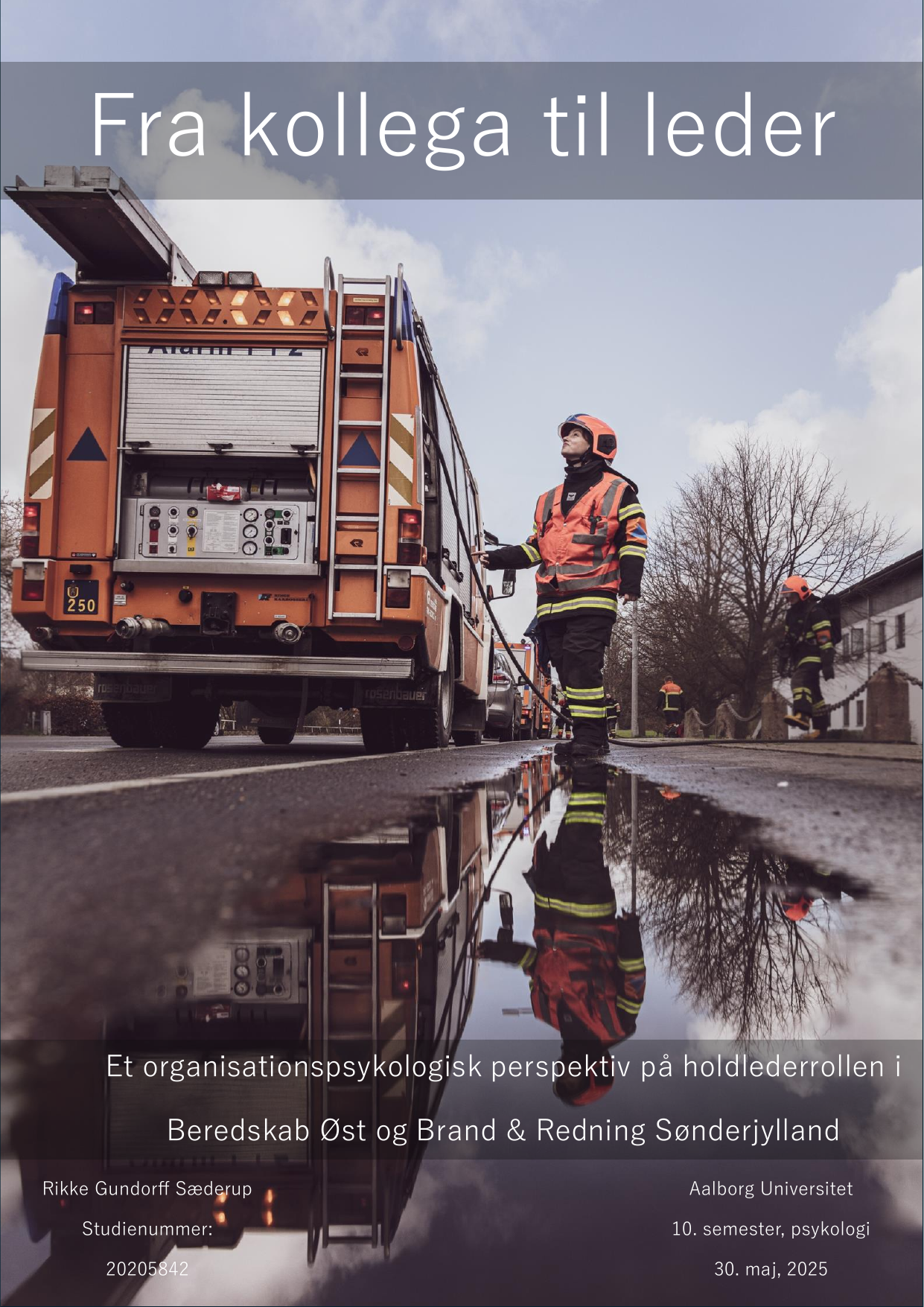
Fra kollega til leder: et organisationspsykologisk perspektiv på holdlederrollen i Beredskab Øst og Brand & Redning Sønderjylland
Oversat titel
From Colleague to Leader: An Organizational Psychological Perspective on the Squad Leader Role in Beredskab Øst and Brand & Redning Sønderjylland
Forfatter
Semester
4. semester
Uddannelse
Udgivelsesår
2025
Afleveret
2025-05-30
Antal sider
66
Abstract
This master's thesis was developed as a collaborative project with the Danish Emergency Management Agency (DEMA). The projects objective is to deepen our understanding of squadleader training by examining the experiences of firefighters transitioning to squadleader roles. The research question guiding this project is: How do Danish firefighters experience the challenges of transitioning from manual firefighter to operational squadleader, and how can these experiences be understood and put into perspective? Using an exploratory approach, this project is a descriptive multiple case study. Primary empirical data consists of semi-structured interviews with four newly trained squadleaders from two different emergency services: one professional (Beredskab Øst) and one volunteer (Brand & Redning Sønderjylland). The interviews were analyzed with inspiration from thematic analysis and grounded theory, guided by a pragmatic perspective that prioritizes the contextual value of the insights. The following themes and dynamics were revealed within the two cases: Beredskab Øst: • Results indicated friction and strained relationships between employees from Falck (supplier company) and Beredskab Øst (provider company). This appears to be driven by a desire to maintain social identity and in-group status, fostering an institutional logic of distance. • New squadleaders experienced challenges in onboarding and a sense of professional insecurity, particularly when handling new task types (e.g., automatic fire alarm responses). This was resolved through peer mentoring and support from more experienced colleagues, highlighting the importance of the squadleader's ability to build strong relationships. • Another important challenge involved navigating an unofficial hierarchy based on e.g. experience, which coexists alongside the formal structure. This could make it difficult for new squadleaders to assert authority over older and more skilled firefighters. • An interesting leadership identity emerged, emphasizing a supportive role and participation in collective tasks (e.g., cleanup). This directly challenges traditional, directive leadership styles. Brand & Redning Sønderjylland: • The volunteer environment was characterized by a strong sense of community and a culture centered on helpfulness, alongside an informal, flexible approach to task resolution. The transition to squadleader was generally positive, mostly due to a generational shift and a cultural change away from a more ruthless tone. • The organization demonstrated a cultural shift away from traditional, rigid approaches, and wished toward a more inclusive and informal structure. • The leadership identity here was affected by the squadleader being more like a coordinator with natural authority, acting as a role model and motivating through transformational leadership by strengthening group bonds – making the transistion more natural. • The role as squadleder was driven by strong commitment, rooted in a deep personal identity, further manifested as a stewardship-oriented leadership approach in the organization. The study's conclusions suggest that the transition to squadleader is not necessarily as problematic as first assumed, particularly when the social dimension of leadership functions effectively. Insights from the volunteer organization could potentially inspire the professional organization in an increasingly unpredictable and complex world. The volunteer emergency service can be viewed as a prototype for the flexible and resilient organization that the future will demand. A need to support volunteer emergency services is proposed, as well as the organizational empowerment of employees to handle acute crises, even beyond organizational boundaries. While this case study's strength lies in its in-depth insights, its limitations include restricted generalizability and potential researcher bias. Nevertheless, the study offers contributions that can serve as inspiration for further research and development within emergency management organizations and leadership studies in general.
Emneord
